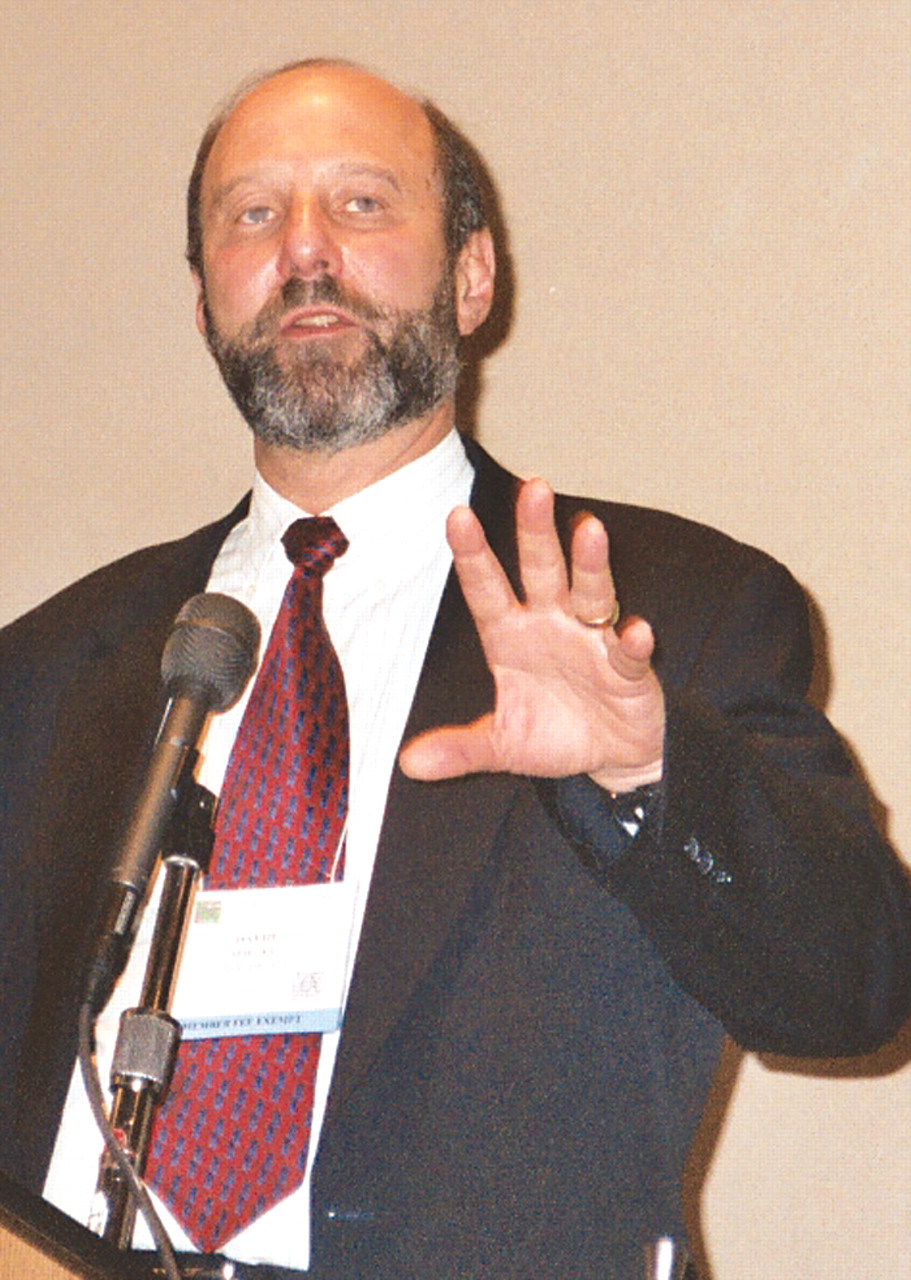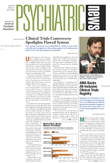Scientific consensus is emerging around psychosocial stress as a critical factor in medical illness, according to David Spiegel, M.D. Among women with metastatic breast cancer, psychotherapy has a significant effect on patient well-being and satisfaction—and possibly on patient survival, though that remains to be conclusively proven, he said.
In a presentation at APA's 2004 annual meeting in New York City in May, Spiegel described more than two decades of work using supportive expressive therapy and other psychosocial interventions in women with metastatic breast cancer. He outlined how psychosocial stress and psychosocial interventions affect specific areas of the brain and reviewed his own research and that of others showing the appreciable effect of those interventions on patient well-being and satisfaction.
Regarding the question of whether psychosocial interventions can prolong survival among breast cancer patients, research has yielded conflicting results. But Spiegel noted that psychotherapy, in contrast to many standard medical treatments for cancer, never makes the patient worse, and he emphasized the need for medicine to return to the priority of “caring over curing.”
Spiegel's own landmark study published in the October 14, 1989, Lancet showed a significant increase in survival time among 50 women who had metastatic breast cancer and received group psychotherapy and self-hypnosis as a form of pain relief in addition to routine oncological care, compared with a control group of 36 women who received only routine care.
At the 10-year follow-up, only three of the patients were alive. Review of death records for the remaining 83 showed that survival from time of randomization and onset of intervention was an average of 36.6 months in the treatment group and 18.9 months for the control group.
Other studies have not shown a positive survival benefit. Among 10 published studies of psychotherapy for metastatic breast cancer, five have shown a positive effect on survival, and five have shown no effect on survival, Spiegel reported.
“The research is mixed, but the studies are not randomly distributed,” he said. “It's now a respectable scientific question whether helping people cope with traumatic stress can improve survival.”
Spiegel is the Jack, Lulu, and Sam Wilson Professor of Medicine and associate chair of the department of psychiatry and behavioral sciences at Stanford University School of Medicine. He is also director of the Center on Stress and Health.
Stress Impairs Cognition
Spiegel said experience with patients with posttraumatic stress disorder (PTSD) has shown that traumatic stress results in significant effects on emotion and cognition, along with intrusive, reoccurring images of the trauma. He described brain research on patients with PTSD showing hyperactivity in the amygdala, the occipital cortex, and the hippocampal region and hypoactivity in the Brocas area.
These areas correspond neuroanatomically to what is sometimes described as the “speechless horror” of trauma: a profound dysregulation of feelings, thoughts, and visual imagery associated with the traumatic event, accompanied by a diminished capacity to express those feelings in words.
All of these features are familiar to patients diagnosed with cancer. The trauma of a diagnosis can so severely disrupt cognition that hearing and processing critical information provided by surgeons and physicians during consultations can be difficult or impossible, Spiegel said.
It is commonly known, for instance, that patients told they have a cancer hear as little as 15 percent of what a physician tells them; for that reason patients at Stanford's Cancer Center receive an audiotape of important medical consultations so they can listen again and again with family members, he said.
“Everything you do is suddenly a decision; there are no automatic routines,” Spiegel said. “Whether to go back to work, how to find your way to the hospital—everything you have to do involves choices.... In addition to the emotional arousal, that can make processing information extremely difficult.”
The existential issues that confront cancer patients are profound, though in fact people may live with cancer for years. All patients who are“ told they have cancer think they are going to die of it, even though half the people will live to die of something else,” he said. “It has been transformed in this era from a terminal illness to a chronic illness, and even if people are dying of it, they are dying later.”
`I Feel Attacked'
So from diagnosis to treatment to outcome, cancer can be conceived of as a series of stressors. And cancer treatment—sometimes called “slash, poison, and burn”— feels like punishment.
“The treatments feel much worse than the disease for much of the course of the illness,” Spiegel said. “So there is a kind of interaction in which patients feel punished by their doctors.”
Spiegel likened the psychosocial effect of a diagnosis of cancer to the traumatic stress that millions of Americans felt in the aftermath of the terrorist attacks on September 11, 2001. He quoted the words of a patient who told him on September 12, “Welcome to my world. Now you know what it feels like to have breast cancer, because I feel I have been attacked by my body.”
A Web-based survey of responses to the terrorist attacks, posted on September 28, 2001, appears to confirm the effects of traumatic stress on functioning, as well as some of the factors that can be protective against those effects.
Spiegel reported baseline and six-month follow-up data on a sample of 1,281 American respondents who were not proximally exposed to the attacks but who responded to the survey.
The results showed that the size of social network was associated with less distress at follow-up and with more well-being at baseline. Conversely, being in an environment characterized by social constraints, in which expressions of emotion are discouraged, was associated with more distress at baseline and at follow-up. So, too, was substance abuse, denial, the tendency to suppress emotion, and tendency toward self-blame.
He noted that the tendency to self-blame in response to trauma is often at work among cancer patients too. Individuals will imagine a script in which they are somehow responsible for the trauma as a way of exercising control, he said.
“People would rather feel guilty than helpless,” Spiegel said.“ Helplessness is the essence of trauma.”
The findings point to “a vicious cycle of bad adjustment” to traumatic stress that leads to a bad outcome, with clear therapeutic implications.
“If you can reverse this vicious circle by helping people to confront rather than to deny and avoid their stressors by reducing self-blame and cognitively restructuring their experience and by changing their social environment, perhaps one can have an ameliorative effect on their stress-response pattern,” Spiegel said.
The findings also appear to corroborate the theoretical basis upon which Spiegel and colleagues have built their psychotherapeutic work with breast cancer patients. They have used a combination of supportive-expressive group therapy and self-hypnosis for pain relief, whose principles are encapsulated in the acronym “FACES”: Face rather than flee, Alter your world view, Cope actively, Express emotion, and obtain Social support.
Spiegel outlined seven themes to supportive-expressive group therapy: building new bonds of social support, encouraging the expression of emotion, detoxifying fears of dying, reordering life priorities, fortifying families, clarifying communication with doctors, and learning how to manage symptoms.
He described research showing that hypnosis can alter the brain's perception of pain. In one study, for instance, highly hypnotizable subjects were instructed to look at a black-and-white grid and mentally fill it with color; in another condition, hypnotized patients were asked to mentally drain a colored grid of color.
PET scans showed that when the patients were looking at black and white but thought it was color, there was a significant increase in blood flow to the part of the brain that processes color; when they were looking at color but thought it was black and white, there was a significant decrease in blood flow to the same region.
“When people thought they were seeing color, their brain was acting as though it was seeing color,” Spiegel said. “So we are actually altering perceptual processing, not just how people react to input.”
In this way, hypnosis can cause the brain to alter its perception of pain in the body. “There is evidence that hypnosis is a shortcut to access specific aspects of brain perceptual processing that can be used in a way that is clinically effective in helping people deal with stress,” Spiegel said. ▪

